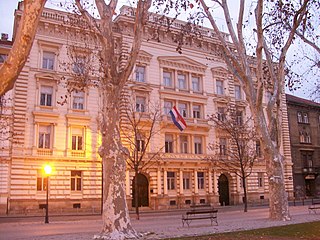
The politics of Finland take place within the framework of a parliamentary representative democracy. Finland is a republic whose head of state is President Alexander Stubb,who leads the nation's foreign policy and is the supreme commander of the Finnish Defence Forces. Finland's head of government is Prime Minister Petteri Orpo,who leads the nation's executive branch,called the Finnish Government. Legislative power is vested in the Parliament of Finland,and the Government has limited rights to amend or extend legislation. The Constitution of Finland vests power to both the President and Government:the President has veto power over parliamentary decisions,although this power can be overruled by a majority vote in the Parliament.

The European Court of Justice (ECJ),formally just the Court of Justice,is the supreme court of the European Union in matters of European Union law. As a part of the Court of Justice of the European Union,it is tasked with interpreting EU law and ensuring its uniform application across all EU member states under Article 263 of the Treaty of the Functioning of the European Union (TFEU).

The General Court,informally known as the European General Court (EGC),is a constituent court of the Court of Justice of the European Union. It hears actions taken against the institutions of the European Union by individuals and member states,although certain matters are reserved for the European Court of Justice. Decisions of the General Court can be appealed to the Court of Justice,but only on a point of law. Prior to the coming into force of the Lisbon Treaty on 1 December 2009,it was known as the Court of First Instance.

Patricia Ann McGowan Wald was an American lawyer and jurist who served as the chief judge of the United States Court of Appeals for the District of Columbia Circuit from 1986 until 1991. She was the Court's first female chief judge and its first woman to be elevated,having been appointed by President Jimmy Carter in 1979. From 1999 to 2001,Wald was a Justice of the International Criminal Tribunal for the former Yugoslavia.

Under the Constitution of Finland,everyone is entitled to have their case heard by a court or an authority appropriately and without undue delay. This is achieved through the judicial system of Finland.

The judicial system of Turkey is defined by Articles 138 to 160 of the Constitution of Turkey.
Allan Viktor Johnsson Rosas is a Finnish jurist who served as a judge of the European Court of Justice from 2002 until 2019.

The Council of State is the Supreme Administrative Court of Greece.

The Judiciary of the Czech Republic is set out in the Constitution,which defines courts as independent institutions within the constitutional framework of checks and balances.

Koen Lenaerts,Baron Lenaerts is a Belgian jurist and the President of the Court of Justice of the European Union. He is also a Professor of European Law at the Katholieke Universiteit Leuven and was a member of the Coudenberg group,a Belgian federalist think tank.

The judicial system of Sweden consists of the law of Sweden and a number of government agencies tasked with upholding security and rule of law within the country. The activities of these agencies include police and law enforcement,prosecution,courts,and prisons and other correctional services.

The Court of Justice of the European Union (CJEU) is the judicial branch of the European Union (EU). Seated in the Kirchberg quarter of Luxembourg City,Luxembourg,this EU institution consists of two separate courts:the Court of Justice and the General Court. From 2005 to 2016,it also contained the Civil Service Tribunal. It has a sui generis court system,meaning 'of its own kind',and is a supranational institution.

The judiciary of Croatia is a branch of the Government of Croatia that interprets and applies the laws of Croatia,to ensure equal justice under law,and to provide a mechanism for dispute resolution. The legal system of Croatia is a civil law system,historically influenced by Austrian,Hungarian and Yugoslav law,but during the accession of Croatia to the European Union,the legal system was almost completely harmonised with European Union law. The Constitution of Croatia provides for an independent judiciary,led by a Supreme Court and a Constitutional Court. The Ministry of Justice handles the administration of courts and judiciary,including paying salaries and constructing new courthouses. It also administers the prison system.
AndréPotocki is a French jurist and was appointed a judge of the European Court of Human Rights on 4 November 2011.
Sir Konrad Hermann Theodor Schiemann,PC is a former German-British barrister and judge. He served on the Court of Appeal,and he was also a member of the Court of Justice of the European Union.
The Judiciary of Azerbaijan exercises judicial power in Azerbaijan. Although the Azerbaijan constitution nominally guarantees judicial independence,the executive firmly controls prosecutors and judges. Judges and prosecutors collaborate in Azerbaijan to repress political opponents.

The Federal Supreme Court of Ethiopia is the highest court in Ethiopia. It was established by the Federal Democratic Republic of Ethiopia constitution in 1994 and is currently located in Addis Ababa. Article 78 of the Constitution establishes the judiciary and at the top is the FSC. By the Constitution,the Federal Supreme Court has "the power of cassation over any final court decision containing a basic error of law". In 2018,Prime Minister Abiy Ahmed appointed Meaza Ashenafi to be the first female president of the Federal Supreme Court. Solomon Areda Waktolla was appointed as Vice President of the Federal Supreme Court. Both were resigned by the Parliament on 17 January 2023,and replaced by Tewodros Mihret and Abeba Embiale as Chief Justice and Deputy Chief Justice of the Supreme Court respectively.

In the European Union,the advocates general are high-ranking functionaries serving in the European Court of Justice (ECJ). Modelled after the French commissaire du gouvernement,the position of advocate general was created together with the European Court of Justice in 1951,when the Treaty of Paris was signed.













